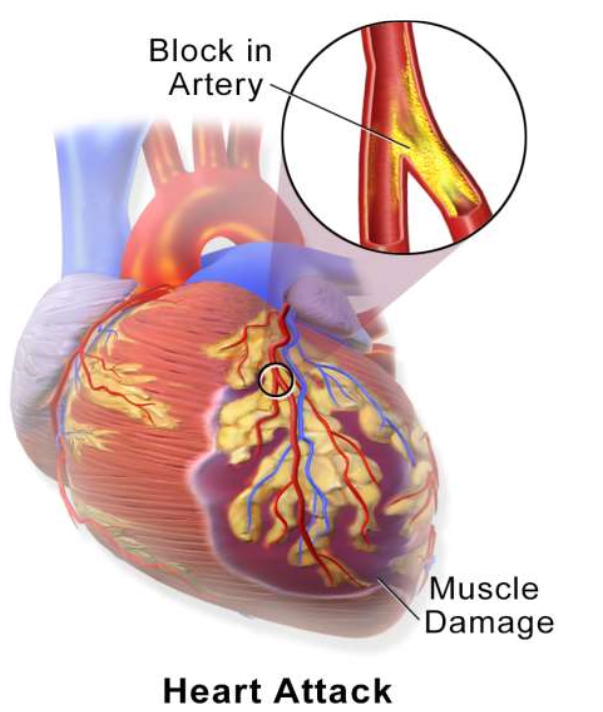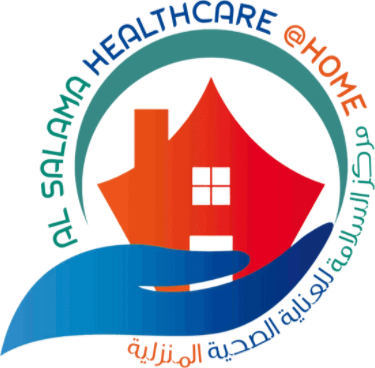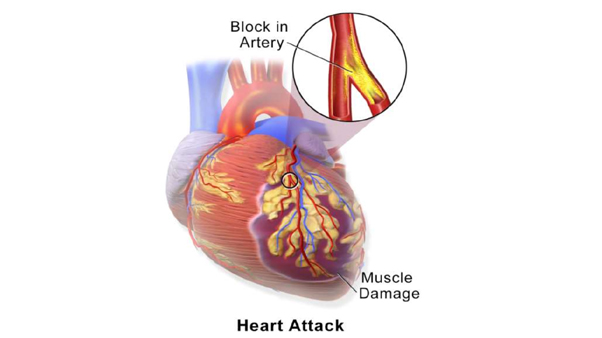Heart attack
A heart attack occurs when the flow of blood to the heart is blocked, most often by a build-up of fat, cholesterol and other substances, which form a plaque in the arteries that feed the heart (coronary arteries). The interrupted blood flow can damage or destroy part of the heart muscle.
A heart attack, also called a myocardial infarction, can be fatal, but treatment has improved dramatically over the years. It’s crucial to call 911 or emergency medical help if you think you might be having a heart attack.

Symptoms
Common heart attack signs and symptoms include:
- Pressure, tightness, pain, or a squeezing or aching sensation in your chest or arms that may spread to your neck, jaw or back
- Nausea, indigestion, heartburn or abdominal pain
- Shortness of breath
- Cold sweat
- Fatigue
- Lightheadedness or sudden dizziness
Heart attack symptoms vary
Not all people who have heart attacks have the same symptoms or have the same severity of symptoms. Some people have mild pain; others have more severe pain. Some people have no symptoms, while for others, the first sign may be sudden cardiac arrest. However, the more signs and symptoms you have, the greater the likelihood you’re having a heart attack.
Some heart attacks strike suddenly, but many people have warning signs and symptoms hours, days or weeks in advance. The earliest warning may be recurrent chest pain (angina) that’s triggered by exertion and relieved by rest. Angina is caused by a temporary decrease in blood flow to the heart.
A heart attack differs from a condition in which your heart suddenly stops (sudden cardiac arrest, which occurs when an electrical disturbance disrupts your heart’s pumping action and causes blood to stop flowing to the rest of your body). A heart attack can cause cardiac arrest, but it’s not the only cause.
Causes
A heart attack occurs when one or more of your coronary arteries become blocked. Over time, a coronary artery can narrow from the buildup of various substances, including cholesterol (atherosclerosis). This condition, known as coronary artery disease, causes most heart attacks.
During a heart attack, one of these plaques can rupture and spill cholesterol and other substances into the bloodstream. A blood clot forms at the site of the rupture. If large enough, the clot can completely block the flow of blood through the coronary artery.
Another cause of a heart attack is a spasm of a coronary artery that shuts down blood flow to part of the heart muscle. Use of tobacco and of illicit drugs, such as cocaine, can cause a life-threatening spasm. A heart attack can also occur due to a tear in the heart artery (spontaneous coronary artery dissection).
Treatments and drugs
Heart attack treatment at a hospital
With each passing minute after a heart attack, more heart tissue loses oxygen and deteriorates or dies. The main way to prevent heart damage is to restore blood flow quickly.
Medications
Medications given to treat a heart attack include:
- Aspirin. The 911 operator may instruct you to take aspirin, or emergency medical personnel may give you aspirin immediately. Aspirin reduces blood clotting, thus helping maintain blood flow through a narrowed artery.
- Thrombolytics. These drugs, also called clotbusters, help dissolve a blood clot that’s blocking blood flow to your heart. The earlier you receive a thrombolytic drug after a heart attack, the greater the chance you’ll survive and with less heart damage.
- Antiplatelet agents. Emergency room doctors may give you other drugs to help prevent new clots and keep existing clots from getting larger. These include medications, such as clopidogrel (Plavix) and others, called platelet aggregation inhibitors.
- Other blood-thinning medications. You’ll likely be given other medications, such as heparin, to make your blood less “sticky” and less likely to form clots. Heparin is given intravenously or by an injection under your skin.
- Pain relievers. You may receive a pain reliever, such as morphine, to ease your discomfort.
- Nitroglycerin. This medication, used to treat chest pain (angina), can help improve blood flow to the heart by widening (dilating) the blood vessels.
- Beta blockers. These medications help relax your heart muscle, slow your heartbeat and decrease blood pressure, making your heart’s job easier. Beta blockers can limit the amount of heart muscle damage and prevent future heart attacks.
- ACE inhibitors. These drugs lower blood pressure and reduce stress on the heart.
Surgical and other procedures
In addition to medications, you may undergo one of the following procedures to treat your heart attack:
- Coronary angioplasty and stenting. Doctors insert a long, thin tube (catheter) that’s passed through an artery, usually in your leg or groin, to a blocked artery in your heart. If you’ve had a heart attack, this procedure is often done immediately after a cardiac catheterization, a procedure used to locate blockages. This catheter is equipped with a special balloon that, once in position, is briefly inflated to open a blocked coronary artery. A metal mesh stent may be inserted into the artery to keep it open long term, restoring blood flow to the heart. Depending on your condition, your doctor may opt to place a stent coated with a slow-releasing medication to help keep your artery open.
- Coronary artery bypass surgery. In some cases, doctors may perform emergency bypass surgery at the time of a heart attack. If possible, your doctor may suggest that you have bypass surgery after your heart has had time — about three to seven days — to recover from your heart attack.
Bypass surgery involves sewing veins or arteries in place beyond a blocked or narrowed coronary artery, allowing blood flow to the heart to bypass the narrowed section.
Once blood flow to your heart is restored and your condition is stable, you’re likely to remain in the hospital for several days.
Prevention
It’s never too late to take steps to prevent a heart attack — even if you’ve already had one. Here are ways to prevent a heart attack.
- Medications. Taking medications can reduce your risk of a subsequent heart attack
and help your damaged heart function better. Continue to take what your doctor
prescribes, and ask your doctor how often you need to be monitored. - Lifestyle factors. You know the drill: Maintain a healthy weight with a heart-healthy
diet, don’t smoke, exercise regularly, manage stress and control conditions that can
lead to heart attack, such as high blood pressure, high cholesterol and diabetes.

